leave 复合宾语
- 格式:ppt
- 大小:31.01 KB
- 文档页数:8
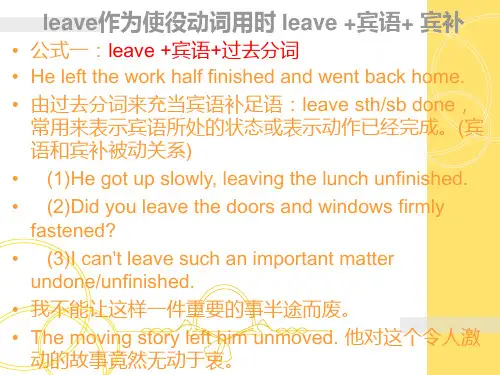
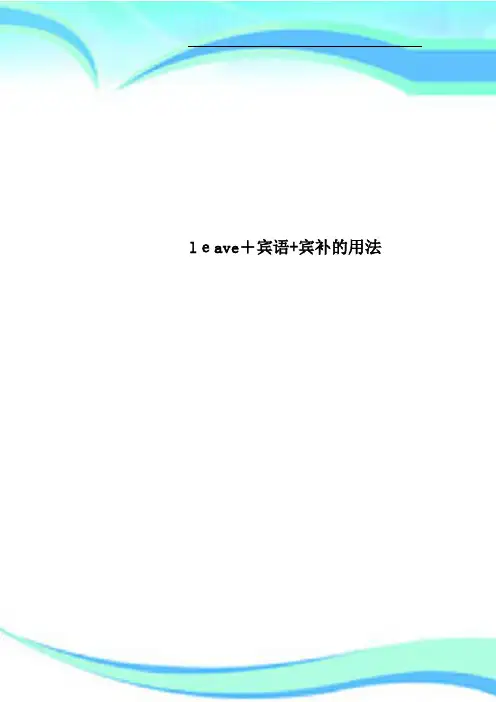
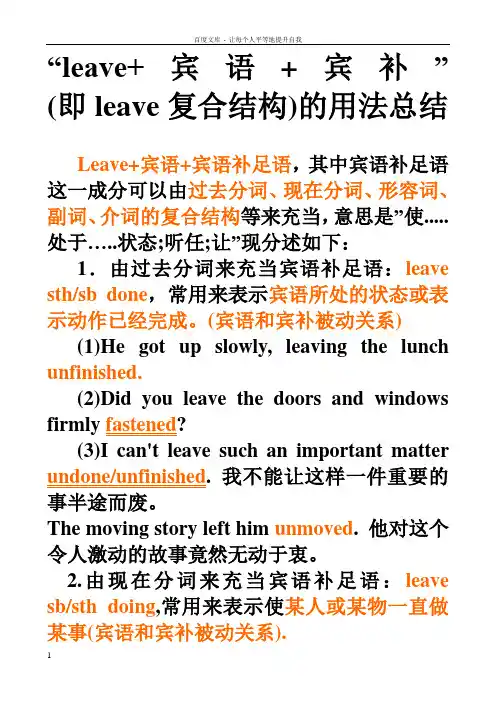
“leave+宾语+宾补”(即leave复合结构)的用法总结Leave+宾语+宾语补足语,其中宾语补足语这一成分可以由过去分词、现在分词、形容词、副词、介词的复合结构等来充当,意思是”使.....处于…..状态;听任;让”现分述如下:1.由过去分词来充当宾语补足语:leave sth/sb done,常用来表示宾语所处的状态或表示动作已经完成。
(宾语和宾补被动关系)(1)He got up slowly, leaving the lunch unfinished.(2)Did you leave the doors and windows firmly fastened?(3)I can't leave such an important matter undone/unfinished. 我不能让这样一件重要的事半途而废。
The moving story left him unmoved. 他对这个令人激动的故事竟然无动于衷。
2.由现在分词来充当宾语补足语:leave sb/sth doing,常用来表示使某人或某物一直做某事(宾语和宾补被动关系).(1)Don’t leave her waiting outside in the rain.(2)They went off together and left me sitting there.(3)We left him painting the gate.△可用于被动语态:The papers were left lying around.3.由形容词来充当宾语补足语:(1)You’d better leav e the drawing-room door open.(2)His illness has left him weak.△可用于被动语态:The window was left open.4.由副词作宾语补足语(1)What has left him away for so long?什么事使他离开了这么长时间?(2)We can’t leave the light on when leaving.5. 由介词的复合结构充当宾语补足语:(1)Leave him in peace!(2)His illness left him with a weak heart.(3)You’ve left her name off the list.(4)This matter left her without a way of hope. 这件事使她没有一丝一毫的希望。
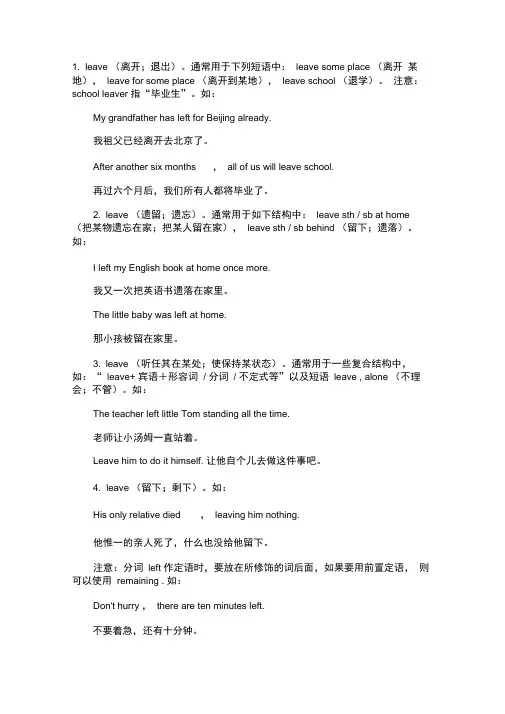
1. leave (离开;退出)。
通常用于下列短语中:leave some place (离开某地),leave for some place (离开到某地),leave school (退学)。
注意:school leaver 指“毕业生”。
如:My grandfather has left for Beijing already.我祖父已经离开去北京了。
After another six months ,all of us will leave school.再过六个月后,我们所有人都将毕业了。
2. leave (遗留;遗忘)。
通常用于如下结构中:leave sth / sb at home (把某物遗忘在家;把某人留在家),leave sth / sb behind (留下;遗落)。
如:I left my English book at home once more.我又一次把英语书遗落在家里。
The little baby was left at home.那小孩被留在家里。
3. leave (听任其在某处;使保持某状态)。
通常用于一些复合结构中,如:“ leave+ 宾语+形容词/ 分词/ 不定式等”以及短语leave , alone (不理会;不管)。
如:The teacher left little Tom standing all the time.老师让小汤姆一直站着。
Leave him to do it himself. 让他自个儿去做这件事吧。
4. leave (留下;剩下)。
如:His only relative died ,leaving him nothing.他惟一的亲人死了,什么也没给他留下。
注意:分词left 作定语时,要放在所修饰的词后面,如果要用前置定语,则可以使用remaining . 如:Don't hurry ,there are ten minutes left.不要着急,还有十分钟。
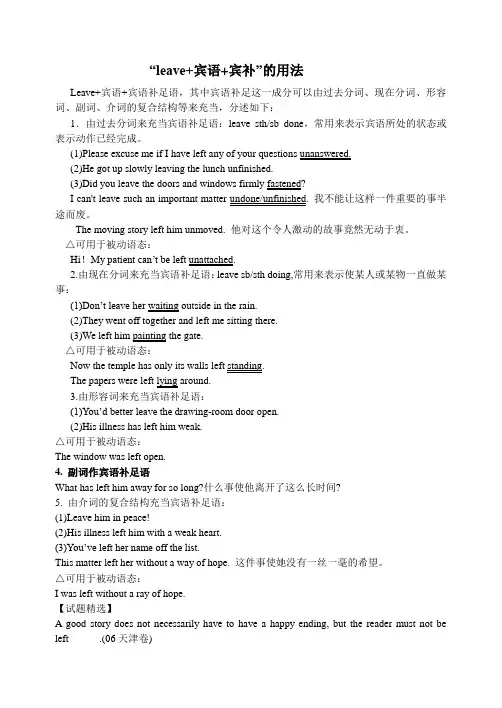
“leave+宾语+宾补”的用法Leave+宾语+宾语补足语,其中宾语补足这一成分可以由过去分词、现在分词、形容词、副词、介词的复合结构等来充当,分述如下:1.由过去分词来充当宾语补足语:leave sth/sb done,常用来表示宾语所处的状态或表示动作已经完成。
(1)Please excuse me if I have left any of your questions unanswered.(2)He got up slowly leaving the lunch unfinished.(3)Did you leave the doors and windows firmly fastened?I can't leave such an important matter undone/unfinished. 我不能让这样一件重要的事半途而废。
The moving story left him unmoved. 他对这个令人激动的故事竟然无动于衷。
△可用于被动语态:Hi!My patient can’t be left unattached.2.由现在分词来充当宾语补足语:leave sb/sth doing,常用来表示使某人或某物一直做某事:(1)Don’t leave her waiting outside in the rain.(2)They went off together and left me sitting there.(3)We left him painting the gate.△可用于被动语态:Now the temple has only its walls left standing.The papers were left lying around.3.由形容词来充当宾语补足语:(1)You’d better leave the drawing-room door open.(2)His illness has left him weak.△可用于被动语态:The window was left open.4. 副词作宾语补足语What has left him away for so long?什么事使他离开了这么长时间?5. 由介词的复合结构充当宾语补足语:(1)Leave him in peace!(2)His illness left him with a weak heart.(3)You’ve left her name off the list.This matter left her without a way of hope. 这件事使她没有一丝一毫的希望。
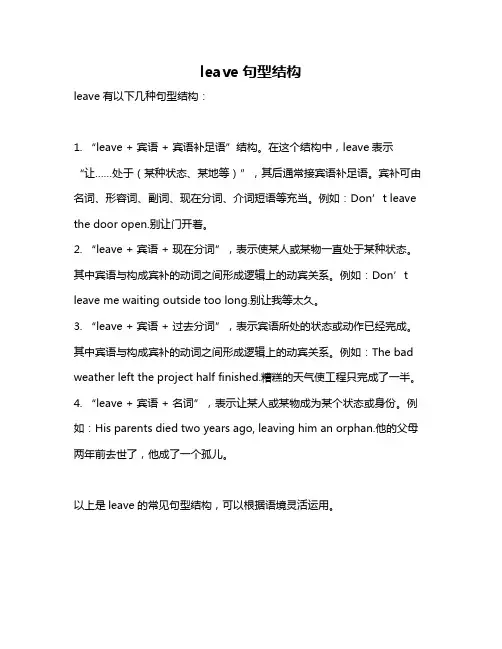
leave句型结构
leave有以下几种句型结构:
1. “leave + 宾语 + 宾语补足语”结构。
在这个结构中,leave表示“让……处于(某种状态、某地等)”,其后通常接宾语补足语。
宾补可由名词、形容词、副词、现在分词、介词短语等充当。
例如:Don’t leave the door open.别让门开着。
2. “leave + 宾语 + 现在分词”,表示使某人或某物一直处于某种状态。
其中宾语与构成宾补的动词之间形成逻辑上的动宾关系。
例如:Don’t leave me waiting outside too long.别让我等太久。
3. “leave + 宾语 + 过去分词”,表示宾语所处的状态或动作已经完成。
其中宾语与构成宾补的动词之间形成逻辑上的动宾关系。
例如:The bad weather left the project half finished.糟糕的天气使工程只完成了一半。
4. “leave + 宾语 + 名词”,表示让某人或某物成为某个状态或身份。
例如:His parents died two years ago, leaving him an orphan.他的父母两年前去世了,他成了一个孤儿。
以上是leave的常见句型结构,可以根据语境灵活运用。
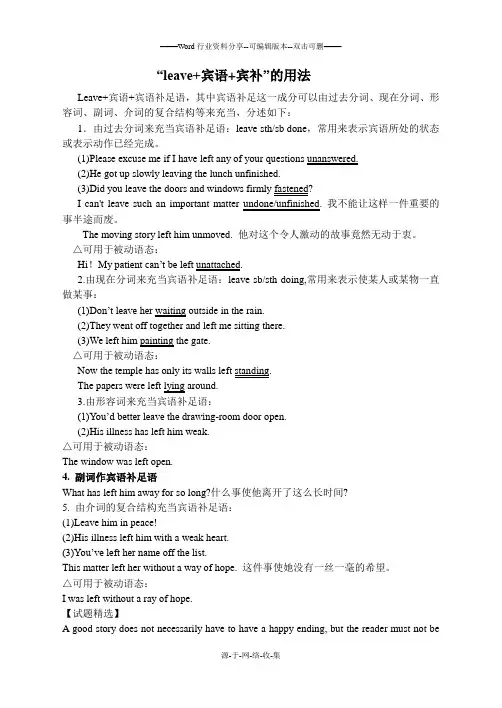
“leave+宾语+宾补”的用法Leave+宾语+宾语补足语,其中宾语补足这一成分可以由过去分词、现在分词、形容词、副词、介词的复合结构等来充当,分述如下:1.由过去分词来充当宾语补足语:leave sth/sb done,常用来表示宾语所处的状态或表示动作已经完成。
(1)Please excuse me if I have left any of your questions unanswered.(2)He got up slowly leaving the lunch unfinished.(3)Did you leave the doors and windows firmly fastened?I can't leave such an important undone/unfinished. 我不能让这样一件重要的事半途而废。
The moving story left him unmoved. 他对这个令人激动的故事竟然无动于衷。
△可用于被动语态:Hi!My patient can’t be left unattached.2.由现在分词来充当宾语补足语:leave sb/sth doing,常用来表示使某人或某物一直做某事:(1)Don’t leave her waiting outside in the rain.(2)They went off together and left me sitting there.(3)We left him painting the gate.△可用于被动语态:Now the temple has only its walls left standing.The papers were left lying around.3.由形容词来充当宾语补足语:(1)You’d better leave the drawing-room door open.(2)His illness has left him weak.△可用于被动语态:The window was left open.4. 副词作宾语补足语What has left him away for so long?什么事使他离开了这么长时间?5. 由介词的复合结构充当宾语补足语:(1)Leave him in peace!(2)His illness left him with a weak heart.(3)You’ve left her name off the list.This matter left her without a way of hope. 这件事使她没有一丝一毫的希望。
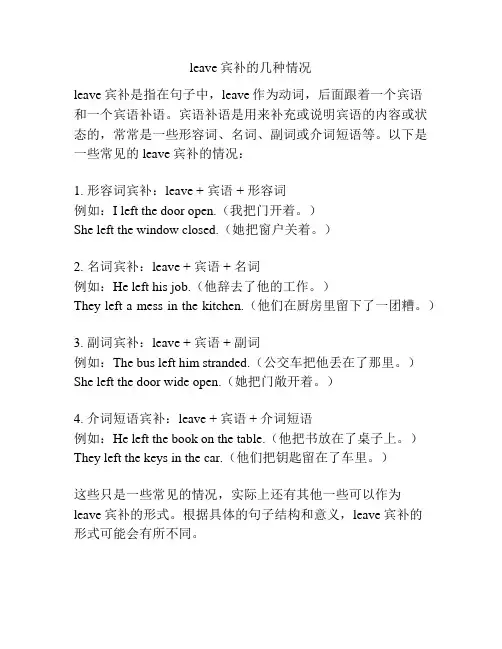
leave宾补的几种情况
leave宾补是指在句子中,leave作为动词,后面跟着一个宾语
和一个宾语补语。
宾语补语是用来补充或说明宾语的内容或状态的,常常是一些形容词、名词、副词或介词短语等。
以下是一些常见的leave宾补的情况:
1. 形容词宾补:leave + 宾语 + 形容词
例如:I left the door open.(我把门开着。
)
She left the window closed.(她把窗户关着。
)
2. 名词宾补:leave + 宾语 + 名词
例如:He left his job.(他辞去了他的工作。
)
They left a mess in the kitchen.(他们在厨房里留下了一团糟。
)
3. 副词宾补:leave + 宾语 + 副词
例如:The bus left him stranded.(公交车把他丢在了那里。
)She left the door wide open.(她把门敞开着。
)
4. 介词短语宾补:leave + 宾语 + 介词短语
例如:He left the book on the table.(他把书放在了桌子上。
)They left the keys in the car.(他们把钥匙留在了车里。
)
这些只是一些常见的情况,实际上还有其他一些可以作为
leave宾补的形式。
根据具体的句子结构和意义,leave宾补的
形式可能会有所不同。
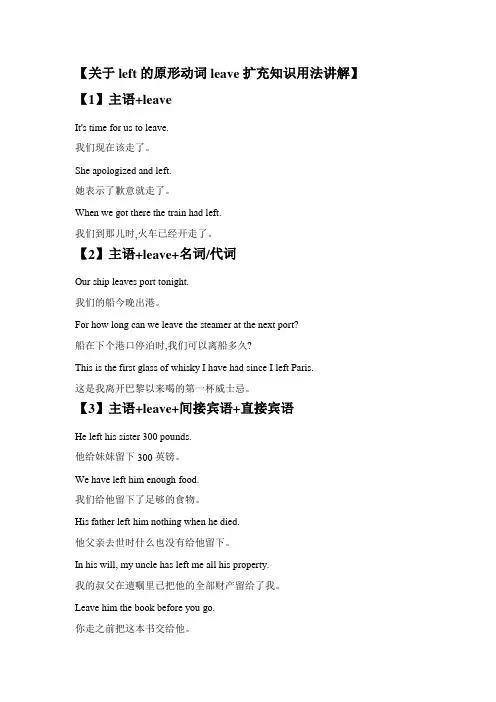
【关于left的原形动词leave扩充知识用法讲解】【1】主语+leaveIt's time for us to leave.我们现在该走了。
She apologized and left.她表示了歉意就走了。
When we got there the train had left.我们到那儿时,火车已经开走了。
【2】主语+leave+名词/代词Our ship leaves port tonight.我们的船今晚出港。
For how long can we leave the steamer at the next port?船在下个港口停泊时,我们可以离船多久?This is the first glass of whisky I have had since I left Paris.这是我离开巴黎以来喝的第一杯威士忌。
【3】主语+leave+间接宾语+直接宾语He left his sister 300 pounds.他给妹妹留下300英镑。
We have left him enough food.我们给他留下了足够的食物。
His father left him nothing when he died.他父亲去世时什么也没有给他留下。
In his will, my uncle has left me all his property.我的叔父在遗嘱里已把他的全部财产留给了我。
Leave him the book before you go.你走之前把这本书交给他。
主语+be ~ed+主语补足语+其它She was left a big fortune by her husband.她丈夫给她留下一大笔遗产。
【4】主语+leave+直接宾语+to+间接宾语This letter needs answering. Can I leave it to you?这封信需要答复,这事交给你办,好吗?Leave him to his father, he'll deal with him.让他父亲去收拾他吧!He left the dictionary to me.他把那本词典给了我。
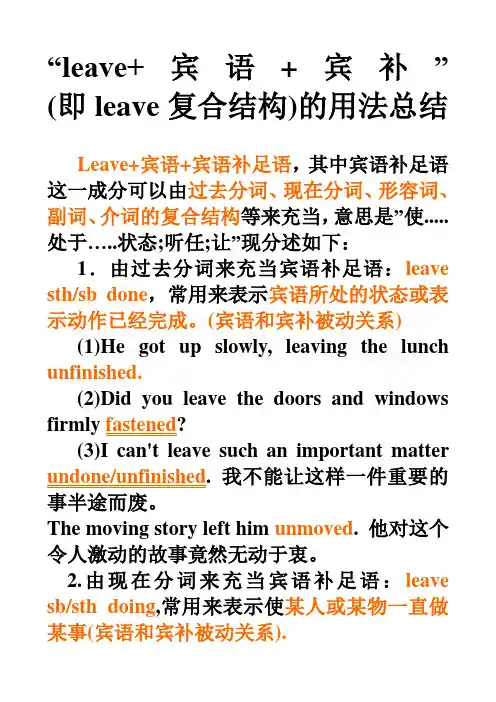
“leave+宾语+宾补”(即leave复合结构)的用法总结Leave+宾语+宾语补足语,其中宾语补足语这一成分可以由过去分词、现在分词、形容词、副词、介词的复合结构等来充当,意思是”使.....处于…..状态;听任;让”现分述如下:1.由过去分词来充当宾语补足语:leave sth/sb done,常用来表示宾语所处的状态或表示动作已经完成。
(宾语和宾补被动关系)(1)He got up slowly, leaving the lunch unfinished.(2)Did you leave the doors and windows firmly fastened?(3)I can't leave such an important matter undone/unfinished. 我不能让这样一件重要的事半途而废。
The moving story left him unmoved. 他对这个令人激动的故事竟然无动于衷。
2.由现在分词来充当宾语补足语:leave sb/sth doing,常用来表示使某人或某物一直做某事(宾语和宾补被动关系).(1)Don’t leave her waiting outside in the rain.(2)They went off together and left me sitting there.(3)We left him painting the gate.△可用于被动语态:The papers were left lying around.3.由形容词来充当宾语补足语:(1)You’d better leav e the drawing-room door open.(2)His illness has left him weak.△可用于被动语态:The window was left open.4.由副词作宾语补足语(1)What has left him away for so long?什么事使他离开了这么长时间?(2)We can’t leave the light on when leaving.5. 由介词的复合结构充当宾语补足语:(1)Leave him in peace!(2)His illness left him with a weak heart.(3)You’ve left her name off the list.(4)This matter left her without a way of hope. 这件事使她没有一丝一毫的希望。
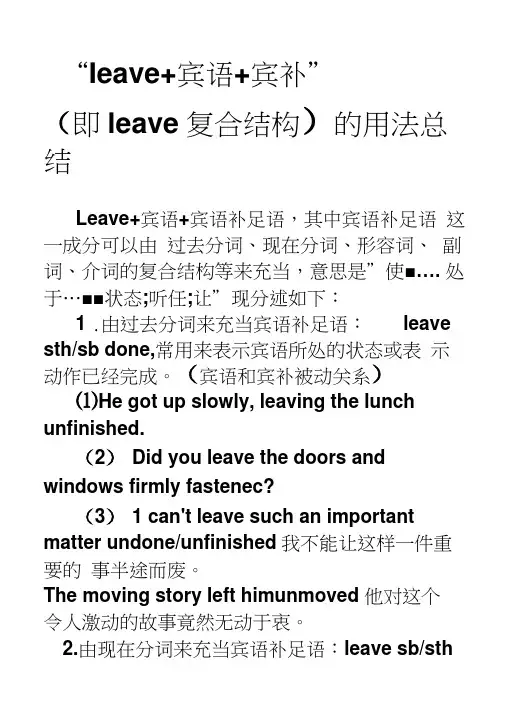
“Ieave+宾语+宾补”(即leave复合结构)的用法总结Leave+宾语+宾语补足语,其中宾语补足语这一成分可以由过去分词、现在分词、形容词、副词、介词的复合结构等来充当,意思是”使■…. 处于…■■状态;听任;让”现分述如下:1 .由过去分词来充当宾语补足语:leave sth/sb done,常用来表示宾语所处的状态或表示动作已经完成。
(宾语和宾补被动关系)⑴He got up slowly, leaving the lunch unfinished.(2)Did you leave the doors and windows firmly fastenec?(3)1 can't leave such an important matter undone/unfinished我不能让这样一件重要的事半途而废。
The moving story left himunmoved 他对这个令人激动的故事竟然无动于衷。
2.由现在分词来充当宾语补足语:leave sb/sthdoing,常用来表示使某人或某物一直做某事(宾语和宾补被动关系).(1) D on ' teave her waiting outside in the rain.(2) They went off together and left me sitting there.(3) We left him painting the gate.△可用于被动语态:The papers were leftlying around.3. 由形容词来充当宾语补足语:(1) You ' dbetter leave the drawing-room door open.(2) His illness has left himweak.△可用于被动语态:The window was left ope n.4. 由副词作宾语补足语(1) What has left him away for so long什么事使他离开了这么长时间?(2) We can'leave the lighton when leaving.5. 由介词的复合结构充当宾语补足语:(1) Leave him in peace(2) His illness left himwith a weak heart.(3) You ' ve left her namff the list(4) This matter left her without a way of hope.这件事使她没有一丝一毫的希望。
leave加宾语加宾补用法六种
1. leave + 宾语 + 形容词/副词
例句:He left the room clean and tidy.(他离开时把房间打扫得干净整洁。
)
2. leave + 宾语 + 名词
例句:Don't forget to leave a tip for the waiter.(别忘了给服务员留下小费。
)
3. leave + 宾语 + 不定式
例句:She left her husband to find a new job.(她离开丈夫去找新工作。
)
4. leave + 宾语 + 名词/代词 + 形容词/副词
例句:We left our children alone at home.(我们把孩子们一个人留在家里了。
)
5. leave + 宾语 + 名词/代词 + 不定式
例句:I left my keys with my neighbor to water the plants.(我把钥匙留给了邻居去给植物浇水。
)
6. leave + 宾语 + 名词/代词 + 宾补
例句:They left him no choice but to accept the offer.(他们没有给他别的选择,只能接受这个提议。
)。
英语问答:句中的leave是什么用法?嘉中问: I hate to see things done by halves — If it be right, do it boldly;if it bewrong, leave it undone. 句子的 leave 是什么用法?答:这句话的意思是: 我讨厌做事半途而废。
对了就大胆去做,错了就不做。
句中的 leave it undone 是“leave + 宾语 + 过去分词” 结构,也就是说,动词 leave后面接了复合宾语。
我们对使役动词make、have、let 比较熟悉,对使役动词leave 多少有点陌生。
其实,用法相似,只是意义上略有不同(有时可以换用)。
Oxford 对 leave 这一用法的注释是:to make or allow somebody/something to remainin a particular condition, place, etc.leave 与make 一样,可接名词、形容词、分词、介词短语、现在分词、过去分词、动词不定式作宾语补足语。
例句:Leave that chair where it is. (名词)把那把椅子留在原处。
You can leave the window open. (形容词)你可以让窗户开着。
The author left us free to imagine the end of the story. (形容词)作者让我们自由想象故事的结局。
I'll have to go back - I think I've left the iron on. (副词)我必须得回去——我觉得好像忘记关电熨斗了。
Leave your sister alone。
(副词)不要打扰你姐姐。
We left him in no doubt who was really to blame. (介词短语)我们让他毫不怀疑到底是谁的错。
【关于left的原形动词leave扩大知识用法讲解】【1】主语+leaveIt's time for us to leave.我们现在该走了。
She apologized and left.她表示了歉意就走了。
When we got there the train had left.我们到那儿时,火车已经开走了。
【2】主语+leave+名词/代词Our ship leaves port tonight.我们的船今晚出港。
For how long can we leave the steamer at the next port?船在下个港口停泊时,我们可以离船多久?This is the first glass of whisky I have had since I left Paris. 这是我离开巴黎以来喝的第一杯威士忌。
【3】主语+leave+间接宾语+直接宾语He left his sister 300 pounds.他给妹妹留下300英镑。
We have left him enough food.我们给他留下了足够的食物。
His father left him nothing when he died.他父亲去世时什么也没有给他留下。
In his will, my uncle has left me all his property.我的叔父在遗嘱里已把他的全部财产留给了我。
Leave him the book before you go.你走之前把这本书交给他。
主语+be ~ed+主语补足语+其它She was left a big fortune by her husband.她丈夫给她留下一大笔遗产。
【4】主语+leave+直接宾语+to+间接宾语This letter needs answering. Can I leave it to you?这封信需要答复,这事交给你办,好吗?Leave him to his father, he'll deal with him.让他父亲去收拾他吧!He left the dictionary to me.他把那本词典给了我。